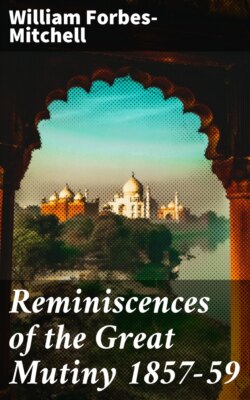Читать книгу Reminiscences of the Great Mutiny 1857-59 - William Forbes-Mitchell - Страница 14
На сайте Литреса книга снята с продажи.
THE NINETY-THIRD—ANECDOTES OF THE SECUNDRABÂGH—GENERAL EWART—THE SHÂH NUJEEF
ОглавлениеTable of Contents
In the first chapter of these reminiscences I mentioned that, before leaving Dover, the Ninety-Third obtained a number of volunteers from the other Highland regiments serving in England. Ours was the only Highland regiment told off for the China expedition, and it was currently whispered that Lord Elgin had specially asked for us to form his guard of honour at the court of China after he had administered a due castigation to the Chinese. Whether the report was true or not, the belief did the regiment no harm; it added to the esprit de corps which was already a prominent feeling in the regiment, and enabled the boys to boast to the girls in Portsmouth that they were "a cut above" the other corps of the army. In support of this, the fact is worthy of being put on record that although the regiment was not (as is usually the case) confined to barracks the night before embarking, but were allowed leave till midnight, still, when the time to leave the barracks came, there was not a single man absent nor a prisoner in the guard-room; and General Britain put it in garrison orders that he had never been able to say the same of any other corps during the time he had commanded the Portsmouth garrison. But the Ninety-Third were no ordinary regiment. They were then the most Scotch of all the Highland regiments; in brief, they were a military Highland parish, minister and elders complete. The elders were selected from among the men of all ranks—two sergeants, two corporals, and two privates; and I believe it was the only regiment in the army which had a regular service of Communion plate; and in time of peace the Holy Communion, according to the Church of Scotland, was administered by the regimental chaplain twice a year. I hope the young second battalion of the Argyle and Sutherland Highlanders are like the old Ninety-Third in this respect. At the same time, I don't ask them ever to pray for the men who took away the numbers from our regiments; may their beards be defiled, is the only feeling I have for them. By taking away the old numbers a great deal was lost, and as far as I can see nothing has been gained except confusion and the utter effacement of all the old traditions of the army. The old numbers could easily have been retained along with the territorial designations. I hope at all events that the present regiment will never forget they are the descendants of the old Ninety-Third, the "Thin Red Line" which Sir Colin Campbell disdained to form four deep to meet the Russian cavalry on the morning of the memorable 25th of October, 1854:—"Steady, Ninety-Third, keep steady! Damn all that eagerness!" were Sir Colin's memorable words. But I am describing the relief of Lucknow, not the "Thin Red Line" of Balaclava.
Among the volunteers who came from the Seventy-Second was a man named James Wallace. He and six others from the same regiment joined my company. Wallace was not his real name, but he never took any one into his confidence, nor was he ever known to have any correspondence. He neither wrote nor received any letters, and he was usually so taciturn in his manner that he was known in the company as the Quaker, a name which had followed him from the Seventy-Second. He had evidently received a superior education, for if asked for any information by a more ignorant comrade, he would at once give it; or questioned as to the translation of a Latin or French quotation in a book, he would give it without the least hesitation. I have often seen him on the voyage out walking up and down the deck of the Belleisle during the watches of the night, repeating the famous poem of Lamartine, Le Chien du Solitaire, commencing:
